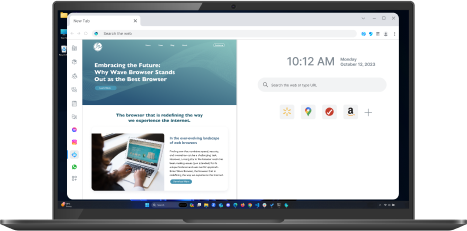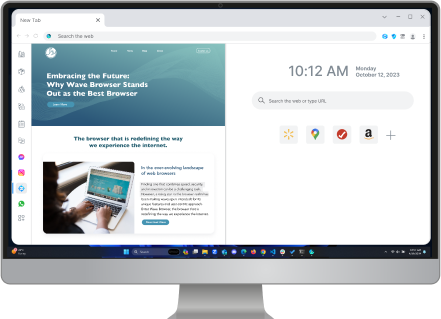Securing Your Personal Information Online
Table of Contents

In today's digital age, personal information protection is more important than ever. From social media platforms to online shopping websites, our personal data and sensitive personal information are constantly being collected and stored. But what are the risks associated with sharing this sensitive data and information? And what are some of the best practices for online security and personal data protection beyond just using private browsing mode?
In this blog, we will delve into the world of data privacy, data security, and personal information protection, exploring how and why personal data is collected online. We will then discuss the potential risks that come with sharing our sensitive personal information and the best online privacy practices you can implement to safeguard your data beyond using the best private browser.
From creating strong and unique passwords to encrypting your internet connection, we will cover all aspects of securing your personal information online. So join us as we navigate the complexities of online privacy and empower ourselves with the data security knowledge and tools to practice better personal information protection in today's digital landscape.
Surf with Ease, Speed, and Security!

Download Wave Browser for a seamless online experience like never before. Try it now!

What is personal data?
Personal data encompasses any information that can be used to identify a specific person, including names, social security numbers, addresses, financial information like credit card and debit card numbers, email address or other contact information, and online identifiers like IP addresses and cookies.
Surf with Ease, Speed, and Security!

Download Wave Browser for a seamless online experience like never before. Try it now!

How and why is personal data collected online?
Personal data is collected online through means like website cookies, forms, and account registrations. Collecting this kind of data, either with our without consent, helps businesses understand their customers and provide them with personalized experiences, targeted ads, and enhanced services.
Surf with Ease, Speed, and Security!

Download Wave Browser for a seamless online experience like never before. Try it now!

What are the risks associated with sharing personal data online?
Sharing personal data online can expose you to risks like identity theft, fraud, and privacy concerns due to targeted advertising. It also makes you vulnerable to phishing attacks and malware. Additionally, in the wrong hands, your data could be sold or shared with third parties without your consent.
These data privacy concerns have increased demand for a private web browser or browsers with a private mode, such as Google Chrome's Incognito mode or the new Microsoft Edge InPrivate browsing. Choosing to use a private browser is one step you can take for personal information protection.
Surf with Ease, Speed, and Security!

Download Wave Browser for a seamless online experience like never before. Try it now!

What is a Private Browser?

A private internet browser, is one that allows users to search the internet while deleting your browser history plus and other data. This is also referred to as incognito mode, private window, or anonymous browsing.
When you activate private browsing mode, your browser typically doesn't save your browsing history, cookies, or temporary files. A private search browser also disables the automatic filling of forms and may isolate the browsing session from regular sessions, clearing any associated data when you close the private browsing window.
Private browsing mode aims to provide a level of privacy and personal data protection by preventing your browsing activity from being visible to others who may have access to your device. However, it's important to note that, along with other private browsing myths, private browsing does not make you completely anonymous or secure online.
Surf with Ease, Speed, and Security!

Download Wave Browser for a seamless online experience like never before. Try it now!

Why isn't private browsing sufficient to protect my personal data?

Private browsing mode, also known as incognito mode, offers some protections by not storing browsing history, cookies, and auto-fill data on your device. However, even the most private browser does not provide complete anonymity or protect you from tracking by websites, your internet service provider (ISP), malware, or network administrators.
Surf with Ease, Speed, and Security!

Download Wave Browser for a seamless online experience like never before. Try it now!

There are various strategies beyond private browsing for effective personal information protection. From creating strong and unique passwords to enabling two-factor authentication, implementing these best practices helps fortify your online accounts against unauthorized access.
1. Create strong and unique passwords:
One of the fundamental steps of personal information protection is creating strong and unique passwords for each of your accounts. Yes, even innocuous sites like your Microsoft Teams account. Avoid using common passwords or easily guessable information, such as your birthdate or pet's name. Instead, opt for long and complex passwords that include a mix of letters, numbers, and special characters. Using a reputable password manager can also help you generate and securely store your passwords.
2. Enable Two-factor Authentication (2FA):
Two-factor authentication provides an additional layer of security by requiring a second form of verification, typically a code sent to your mobile device, in addition to your password. By enabling 2FA on your online accounts, you add an extra barrier against unauthorized access, even if someone manages to obtain your password.
3. Regularly update software and operating systems:
Keeping your software and operating systems up to date is crucial in addressing security vulnerabilities. Developers frequently release updates that patch security flaws and strengthen the overall security of their products. By regularly updating your software, you reduce the risk of falling victim to known vulnerabilities that could be exploited by malicious actors.
4. Use reputable antivirus software:
Installing reputable antivirus software on your devices provides an essential layer of protection against malware, viruses, security breaches, and other online threats. Ensure your antivirus software is up to date and performs regular scans to detect and eliminate any potential threats. Be cautious when downloading software or files from untrusted sources, as they may contain malware.
5. Practice safe browsing habits:
Developing safe browsing habits is crucial to maintaining online security. Exercise caution when clicking on links in emails, particularly from unknown or suspicious sources. Be wary of email attachments, as they can hide malware. Avoid visiting suspicious websites or clicking on pop-up ads that might lead to malware installation. Stick to trusted websites, install privacy extensions, and verify the authenticity of the websites you visit, especially when providing sensitive information.
6. Encrypt your data:
Encrypting your data provides an additional layer of protection, ensuring that your information remains secure both at rest and in transit. Use secure communication channels when transmitting sensitive data, such as online banking or making purchases. Consider using a virtual private network (VPN) to encrypt your internet connection and shield your sensitive information from potential eavesdroppers.
7. Stay informed about online scams and internet threats:
Keeping yourself informed about the latest online threats and scams is crucial in recognizing and avoiding potential risks. Stay updated with security news and follow reputable sources that provide insights into emerging threats. Being aware of the tactics employed by cybercriminals empowers you to make informed decisions and protect yourself online.
8. Stay Informed about US CERT Current Activity
US-CERT (United States Computer Emergency Readiness Team) is a crucial resource for staying updated on the ever-evolving landscape of cybersecurity. By regularly visiting the US-CERT website, you can stay well-informed about the latest security patches, software updates, and emerging trends in cyber threats in the United States. This allows you to take proactive measures to safeguard your personal information online and protect yourself against potential vulnerabilities. US-CERT serves as a trusted authority for staying one step ahead of hackers, identity thieves, and other malicious actors seeking unauthorized access to sensitive data. Stay informed, stay secure.
Surf with Ease, Speed, and Security!

Download Wave Browser for a seamless online experience like never before. Try it now!

Stay secure beyond Private Browsing mode
Using a private browser online, is an important step to protect your online privacy. However, a private browser download alone is not enough to secure your personal information online.
The best web browser for privacy is a valuable tool, but it's important to go beyond it and adopt additional best practices to safeguard your personal information online. From creating strong and unique passwords to enabling two-factor authentication, implementing these strategies strengthens your online security. Regularly updating software, using reputable antivirus software, practicing safe browsing habits, encrypting your data, and staying informed about online threats all contribute to a more secure online experience. By employing these best practices, you can protect your personal information and mitigate the risks of unauthorized access and data breaches.
Surf with Ease, Speed, and Security!

Download Wave Browser for a seamless online experience like never before. Try it now!

























